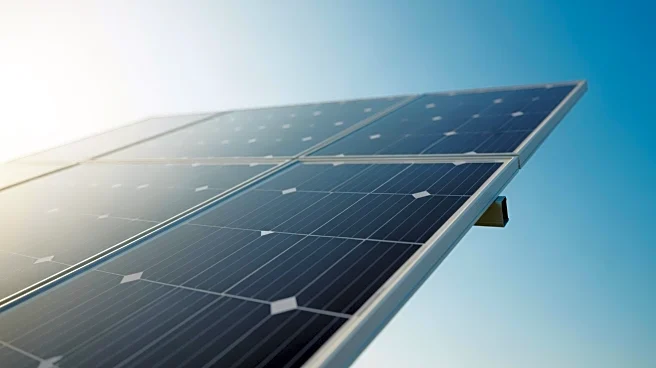What's Happening?
Solar power is increasingly being adopted globally as a reliable solution to power outages, particularly in regions prone to natural disasters. In Jamaica, Hurricane Melissa caused widespread power outages, but
homes equipped with solar panels maintained electricity, highlighting the resilience of solar energy systems. The market for rooftop solar panels in Jamaica has grown significantly, from 1.4 megawatts in 2015 to nearly 65 megawatts in 2023. This trend is part of a broader global movement towards distributed energy resources (DERs), which include small-scale, local energy sources like solar panels, microgrids, and virtual power plants. These technologies offer scalability and independence from traditional power grids, providing a sustainable energy solution.
Why It's Important?
The expansion of solar power as a solution to power outages is significant for several reasons. It offers energy independence, reducing reliance on fossil fuels and imported energy, which can be costly and environmentally damaging. Solar power systems provide resilience against natural disasters, ensuring continuous electricity supply when traditional grids fail. This shift towards renewable energy sources also supports global efforts to combat climate change by reducing carbon emissions. Economically, the adoption of solar power can lower electricity costs for consumers and stimulate local economies through job creation in the renewable energy sector.
What's Next?
The continued growth of solar power adoption is expected to drive further innovations in energy storage and distribution technologies. As more regions invest in solar infrastructure, there will likely be increased demand for policy reforms to support the integration of renewable energy into existing power systems. Additionally, advancements in solar technology could lead to more affordable and efficient solar solutions, making them accessible to a broader range of consumers. The global push for renewable energy is likely to accelerate, with countries setting ambitious targets for solar capacity and exploring new applications for solar technology.
Beyond the Headlines
The shift towards solar power has deeper implications for energy equity and environmental justice. By providing access to clean energy, solar power can empower underserved communities, offering them control over their energy resources and reducing energy poverty. This transition also challenges traditional energy monopolies, promoting decentralized energy systems that prioritize community involvement and sustainability. The cultural shift towards renewable energy reflects a growing awareness of environmental issues and a commitment to sustainable development.








